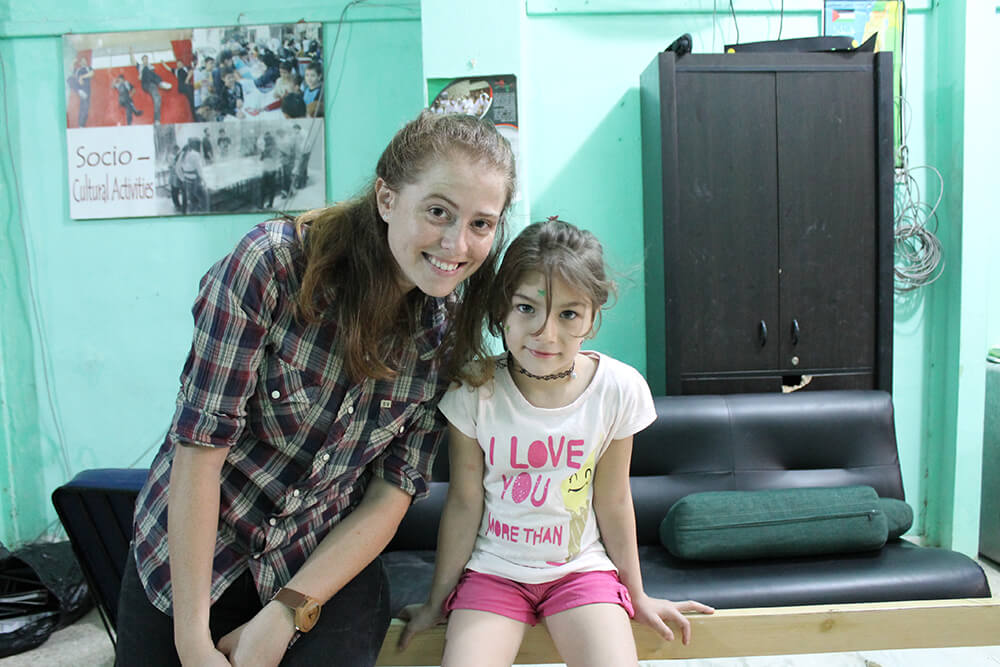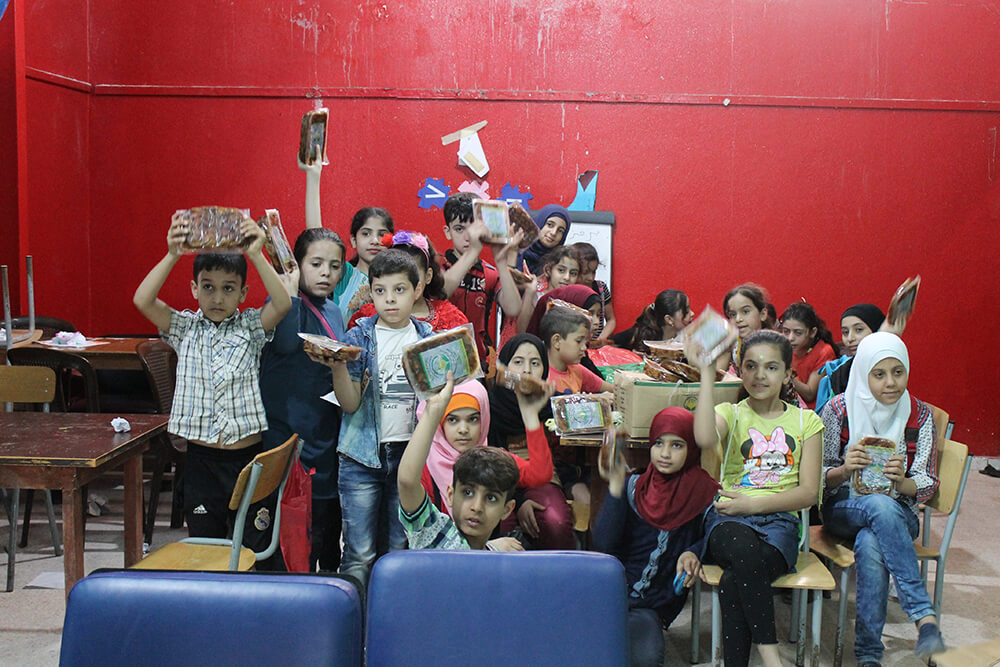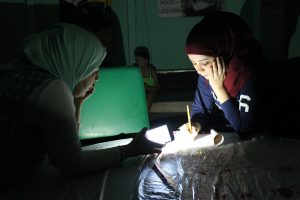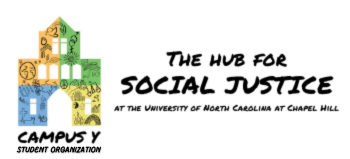
The following blog was written by Lucia Mock.
My work bag is full of silver and blue glitter, and for the past few days, everything that I grab out of this bag – usually important things like my laptop, pens, a notebook – are covered in glitter, and inevitably I get it everywhere – my hands, face, hair. I would be annoyed, but I can’t muster any irritation given the fact that Firas, an 8 year old boy and one of the students at the Nour Center, is to blame for my ubiquitous sparkles. Last week, on my first day back at the Center in two months, he – with his usual stately and serious demeanor – gifted me several items he had made that day, including a drawing, some contraption made with tongue depressors, and a paper boat filled with the aforementioned glitter. It was the first time Firas had given me a gift, so this was – and still feels like – a momentous occasion. So really, I can’t be mad that I’ve got glitter everywhere.
Firas is one of the 150 students attending the Nour Center, an informal education program in Burj al Barajneh refugee camp. The Nour Center provides educational and recreational activities to Palestinian and Syrian refugee youth who live within Burj al Barajneh, a one-square kilometer refugee camp in Beirut, Lebanon that was created in 1948 to house those fleeing the Palestinian-Israeli War. Burj al Barajneh is now home to an estimated 50,000 people – it is overcrowded and the camp’s residents are plagued by a lack of potable water, unreliable access to electricity, and an overwhelming poverty mostly due to their exclusion from Lebanese society (Palestinians in Lebanon are denied access to public education, public transportation, health care, certain professions, and any other rights enjoyed by citizens); despite these challenges, Burj al Barajneh is a vibrant and welcoming community, bustling with life and business and families – and a people that fight tirelessly each day to lead meaningful lives.
The Nour Center was opened in December 2013 to address the educational crisis in Lebanon facing Syrian and Palestinian children and families, and it is staffed and managed by women who live in Burj al Barajneh. Of the estimated 500,000 Syrian children living in Lebanon now (having fled the Syrian Civil War), it is estimated that over half are not in school, for a variety of reasons.*
Mariam al Shaar, a lifelong resident of the camp and the Director of the Women’s Program Association Center** in Burj al Barajneh, recognized the need for educational programming in the camp, and with the help of partners opened the Center in 2013. Originally the center was able to provide services to 25 students.

In the four years since it has been open, the Center has expanded its services and size several times and now runs programming six days a week, has three full-time and two part-time teachers (for the 150 students), and provides various activities including:
● Daily Math, English and Arabic Lessons
● Children’s Rights Awareness Workshops
● Positive Parenting Courses
● Health and Hygiene Workshops
● Music Lessons and Soccer Camp at the American Community School at Beirut
● Trips around Beirut and Lebanon

I have been lucky enough to be a work with the Nour Center for the past three years, first in my role as a counselor at the neighboring American Community School at Beirut (I spent my weekends at the camp teaching English and helping out at the Center) and now as a PhD student at UNC-Chapel Hill studying educational issues for immigrants and refugees. My time here in Lebanon this summer as a Global Engagement Fellow is to help the Nour Center teachers build a more systematic way of addressing the various social-emotional needs that their students have. Because of my previous relationship with the program, and my work as a counselor, my work this summer will be to serve as an adviser and support as the teachers construct their own system and processes dealing with a growing need they have identified: many of the newer students from Syrian are coming from Aleppo and other besieged areas, and have suffered not only the trauma of displacement and now poverty, but often times the horrors of war. Creating a safe space for these children, and ensuring their holistic well-being, has become a priority for the Nour Center. I feel very fortunate to be a part of this process, especially now as a UNC student and Global Engagement Fellow.
All of this leads back to the glitter, and to Firas, who is an adorable, loving young man, but also struggles with hyperactivity and bursts of anger. Coming from a family where violence is present, he is often absent and has come to the Center with bruises. This reality, held against the boy who insisted on pouring more glitter in the paper boat after he had already given it to me, is at times hard to accept. However, it makes the Center’s work all the more immediate and important.
How my time here unfolds is yet to be determined. One important lesson I have learned in working within the camp is to appreciate the ever-changing and often triage-like conditions that the teachers operate in. Coming in with rigid ideas of what I need to accomplish is useless. Rather, keeping an open mind and helping out when and where I can, and as the teachers ask of me, is the more important and fruitful use of my time and any expertise I bring.
* For a comprehensive look into why Syrian children are not in school in Lebanon, see the Human Rights Report from July 2016, Barriers to Education for Syrian Children in Lebanon.
** The Women’s Program Association (WPA) is a UN-affiliated group in Lebanon that provides vocational and educational support to women throughout eight Palestinian refugee camps in Lebanon.
